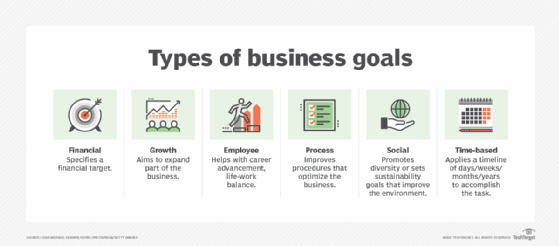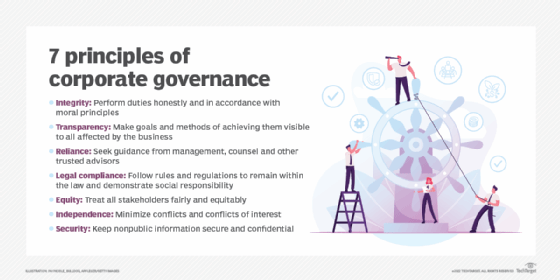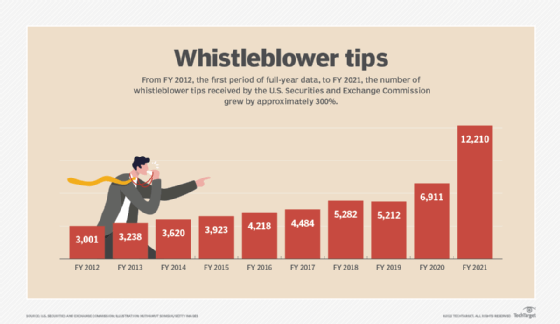accountability
What is accountability?
Accountability is an assurance that an individual or organization is evaluated on its performance or behavior related to something for which it is responsible.
The term is related to responsibility but is regarded more from the perspective of oversight. For example, an employee may be responsible for ensuring that a response to a request for proposal meets the stipulated requirements.
When the performance of a task is substandard, there may or may not be consequences. When there's accountability, however, the employee is held responsible for successfully completing the task or explaining why they failed to do so.
What are the different types of accountability?
Accountability is commonly found in the business world. From accounting departments to marketing teams, accountability ensures that team members are doing their job correctly.
Corporate accountability
Corporate accountability is about the numbers. Each publicly traded corporation must file an annual report containing audited financials. A third-party accountant reviews these reports to ensure that there are no errors or omissions.
Every public company must ensure that its books are accurate and complete. Through performance and accountability reporting (PAR), for example, an organization compiles and documents factors that quantify its profitability, efficiency and adherence to budget, comparing actual results against original targets. The PAR process is usually carried out once per fiscal year, although, in some cases, it is done more often.

Corporate accountability involves being answerable to an organization's stakeholders for all actions and results. Corporate accountants are accountable for ensuring that the information contained in the company's financial reports is correct. Accountants are also responsible for preparing financial statements accurately and completely. This is achieved by conducting audits of the company's accounts. The law requires public companies to have an audit committee whose job is to oversee the auditors.
Additionally, corporate accountability implies that an organization must be answerable for any deviations from its stated goals and values, which might be documented and made publicly available through a mission statement or vision statement. Beyond that, the concept of corporate accountability is often extended to imply a requirement for businesses to follow ethical, responsible and sustainable practices.
Accountability and transparency are generally considered the two main pillars of good corporate governance.

Media accountability
The media in the United States is unique compared to that in other countries because it has constitutionally guaranteed freedom from government interference. However, the First Amendment does not free the press from accountability.
Mainstream news has always had its critics, but today, there are more watchdogs who scrutinize what it does. Independent journalists check facts and correct mistakes. Social networks face criticism for their role in disseminating fake news, promoting hate speech and failing to address issues of online abuse.
Government accountability
The role of corporate money in politics is just one of the global issues surrounding government accountability. The U.S. Agency for International Development defines government accountability measures by these key elements:
- a free and fair legal system;
- protection of human dignity;
- a vibrant civil society, including independent media;
- public confidence in the judicial process and law enforcement agencies; and
- effective security sector reform.
To protect citizens, the government accountability program protects federal, state and local whistleblowers who spot issues and report them to the appropriate authorities. In this model, government entities are held accountable through unofficial internal audits. Anyone can report someone for inappropriate conduct, forcing accountability to be systemic and pervasive throughout organizations.

Political accountability
Political accountability can relate to political contributions, how politicians spend money and political spending itself. For example, the nonpartisan Center for Responsive Politics (now OpenSecrets) published an annual scorecard ranking members of Congress based on their voting records on campaign finance issues.
What is accountability in a relationship?
Accountability in relationships is about individuals taking responsibility for themselves and their actions.
What is accountability in management?
Accountability in the workplace can mean that all employees are accountable for their own actions, behaviors, performance and decisions. It's also linked to increased commitment to work and employee motivation, which leads to higher productivity. Employees who feel they are being held accountable for their actions, behaviors and decisions are motivated to perform better because they know they will get feedback.

What is accountability in nursing?
According to the American Nurses Association's (ANA) Code of Ethics, professional accountability means that individuals are answerable to themselves and peers for their actions. ANA contends that nurses are not only expected to adhere to the high standards of nursing practice, but are also expected to be held accountable for any deviation from those standards.
What is accountability in healthcare?
Healthcare providers should strive to create cultures where doctors, nurses, administrators and patients feel comfortable sharing information about errors and problems. By holding each other accountable, healthcare organizations can work together to make improvements and avoid repeating mistakes.
What is accountability in education?
Accountability in education maintains that schools should hold themselves accountable for student outcomes. It is becoming the latest buzzword in education. One of the main goals of performance-based accountability is to encourage schools to focus on improving performance above all other concerns. Everyone who is being held accountable has an incentive not only to improve performance, but also to avoid declining performance.
What is product owner accountability?
The product owner's role is to define the scope of work and determine how much effort each task should require. Their job is to understand the relationship between tasks to decide whether one task depends on another. Product owners must also ensure that the team understands what needs to get done and who owns each piece of work.
What is the accountability of a Scrum Master?
One of the Scrum Master's key responsibilities is to help teams work together effectively through the Agile software development process.
The Scrum Master ensures that the team follows the Scrum Guide rules and acts as an advocate for the team throughout the project lifecycle. In addition, the Scrum Master helps the team develop skills to manage itself effectively and ensure that the team stays focused on delivering value to stakeholders.
See also: shared responsibility model, Government Accountability Office, HIPAA, compliance and algorithmic transparency.